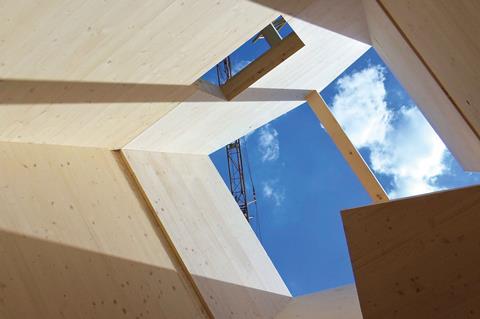- ºÃÉ«ÏÈÉúTV

All the latest updates on building safety reformRegulations latest
- Focus
- Comment
- Programmes
- CPD
- ºÃÉ«ÏÈÉúTV the Future
- Data

2024 events calendar

ºÃÉ«ÏÈÉúTV Awards
Keep up to date
- ºÃÉ«ÏÈÉúTV Boardroom
Just how good is wood?

In the third in our series on construction materials, Thomas Lane looks at whether wood really is the panacea many claim it to be

If there were an award for the most versatile product in the history of construction, then timber would be the clear winner. Readily available and self-generating, it is light, strong, easily worked, durable, visually appealing and highly versatile.
Sawn lengths are good for building frames, roof structures, floors, doors, windows, cladding and furniture. In sheet form it is useful for floor decks, partitions, site hoardings and furniture. And, when lengths of sawn timber are glued together to make very strong and stable engineered timber products such as CLT or glulam, it is suitable for building large structures. So, it is no surprise that UK construction gets through 17 million m3 of timber every year.
The push to decarbonise construction is driving the industry towards greater timber use and specifically structural timber frames. ºÃÉ«ÏÈÉúTVs are traditionally constructed from carbon-intensive steel and concrete, which means the structure can account for half of a building’s upfront carbon. Switching to timber has a potentially massive carbon benefit and, according to Timber Development UK, only 1% of structural frames are made from engineered timber such as CLT or glulam.
So, in theory, there is plenty of scope to cut emissions from construction by using more timber. What are the carbon savings from using more structural timber and is it a panacea for the carbon impact of the industry?
…
This is PREMIUM content, available to subscribers only
You are not currently logged in. Subscribers may LOGIN here.
to access this story

A subscription will provide access to the latest industry news, expert analysis & comment from industry leaders, data and research - including our popular annual league tables. You will receive:
- Print/digital issues delivered to your door/inbox
- Unlimited access to building.co.uk including our archive
- Print/digital supplements
- ºÃÉ«ÏÈÉúTVletters - unlimited access to the stories behind the headlines
now
Get access to premium content
















